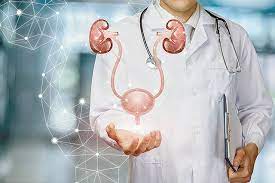What is a Nephrologist?
Nephrology is a medical specialty that focuses on the health of the kidneys. A Nephrologist, or renal physician, is trained in the prevention, diagnosis, and treatment of kidney diseases and illnesses that arise from kidney problems such as diabetes mellitus and autoimmune diseases.
Most people don’t realize it or visit a nephrologist until the disease has become severe and expensive.
Having your kidneys malfunction is even more likely than having your liver malfunction, primarily due to the chronic health conditions that develop simultaneously. Kidney disease can develop from existing health issues like diabetes, obesity, heart disease, and high blood pressure. It can also cause high blood pressure and heart disease to grow, even if you didn’t have these conditions before.
Chronic kidney disease can also lead to health complications like anemia, osteoporosis, a weakened immune system, or an irregular heartbeat. This cause-and-effect relationship shows how important it is to have healthy kidneys and be proactive in seeing a nephrologist who can treat and manage any kidney issues you have.
Nephrologists can develop a management plan that helps you overcome low-functioning kidneys. In some cases, your kidney damage may even be reversible if caught and treated early.
What Does a Nephrologist Do?
Sometimes called renal medicine, nephrology is a specialty within the internal medicine field related to kidney care. It is often connected with hypertension or high blood pressure.
Nephrologists are medical professionals who diagnose, treat, and manage acute and chronic kidney problems and diseases. They also treat associated issues like high blood pressure, fluid retention, and electrolyte and mineral imbalances. In addition, these specialists are in charge of kidney dialysis treatment — both hemodialysis and peritoneal dialysis — and kidney transplants and their follow-up care.
Nephrologists are experts in renal health, and they work to identify issues with your kidneys to help you maintain good health. Your kidneys are important because they filter your blood to remove waste and toxins, and they monitor and balance the water, acid-base, and mineral ratios in the body.
Without proper blood filtering and balanced amounts of fluids and nutrients, your body can become an unhealthy environment. Having low kidney function can put you at risk for chronic kidney disease, kidney failure, or end-stage renal disease, where you require dialysis regularly.
Seeing a nephrologist for your care puts you in the hands of experts who can recommend the best treatment plan. They stay up-to-date on medical advancements for your kidney condition to ensure that you have the most accurate and comprehensive care.
Education and Training
Nephrologists are specialized medical doctors who have received advanced training in the field of nephrology. These doctors complete medical school and a fellowship with board certification in their specialty.
This process involves completing:
Reasons to See a Nephrologist
Most people don’t go to a nephrologist without a referral from their primary care doctor. Typically, seeing a nephrologist means that you have kidney-related symptoms from an unknown cause or health issues only a renal specialist knows how to treat. You might be referred to a nephrologist if you have the following signs or symptoms:
Chronic Urinary Tract Infections
If you get a lot of urinary tract infections (UTI), typically bladder infections, you are at greater risk for the infection to travel up to your kidneys. This also puts you more chance of developing kidney disease, permanent kidney damage, or even kidney failure. Chronic UTI symptoms, especially blood in the urine, fever, and fatigue, can also indicate the early stages of bladder or kidney cancer.
Recurring Kidney Stones
Kidney stones are mineral- or salt-based deposits inside your kidneys, and they cause a lot of pain when passing through your urinary tract. If you get a lot of kidney stones, your kidneys are likely not filtering waste properly and are letting deposits accumulate.
You can also develop kidney stones that begin to block glomerular filtration (part of the urination process) and lower the filtration rate. Any obstructions can start to damage your kidneys and lead to chronic kidney disease.
Foamy Urine
Foamy or bubbly urine means there is a protein in your urine. This condition, called proteinuria, can happen from several causes, some being relatively harmless and others more likely to cause kidney damage. Your urine typically has a bit of protein waste in it, but this protein will pass unnoticed. Only when you have high amounts of protein, do you begin to see foam or bubbles in the urine.
This protein spillover can accompany other symptoms like muscle cramping, shortness of breath, and tiredness and may indicate more moderate stages of chronic kidney disease or early kidney failure. Your nephrologist will likely do a series of blood tests, such as blood urea nitrogen, serum creatinine, and protein-creatinine ratio, to check your blood and kidney health.
Itchy Skin and Joint or Bone Pain
If you’re experiencing bone and joint pain along with itchy skin, you might have a condition called renal bone disease, also known as mineral and bone disorder. This condition can occur alongside kidney disease, and it happens when the kidneys can’t maintain the amount of calcium and phosphorus your bones need. If untreated, this condition can lead to weakened bones and heart and blood vessel problems.
Talk to your doctor if you’re experiencing these symptoms, as a referral to a nephrologist may be necessary.
**What is a Nephrologist?**
**Question: What is a nephrologist?**
**Answer:** A nephrologist is a medical doctor who specializes in diagnosing and treating diseases of the kidneys. The kidneys are two bean-shaped organs located near the middle of the back, and they play a vital role in filtering waste products from the blood and regulating blood pressure.
**Question: Why might I need to see a nephrologist?**
**Answer:** You may need to see a nephrologist if you have any of the following:
* Kidney stones
* Urinary tract infections
* Kidney failure
* High blood pressure
* Diabetes
* Lupus
* Polycystic kidney disease
* Glomerulonephritis
**Question: What are the symptoms of kidney disease?**
**Answer:** The symptoms of kidney disease can vary depending on the stage of the disease. Some common symptoms include:
* Fatigue
* Nausea and vomiting
* Loss of appetite
* Weight loss
* Swelling in the hands, feet, or face
* High blood pressure
* Frequent urination
* Foamy or bloody urine
* Back pain
**Question: What diagnostic tests might a nephrologist perform?**
**Answer:** A nephrologist may perform a variety of diagnostic tests to assess kidney function, including:
* Blood tests
* Urinalysis
* Imaging tests, such as ultrasound, CT scan, or MRI
* Kidney biopsy
**Question: What treatment options are available for kidney disease?**
**Answer:** The treatment options for kidney disease will vary depending on the stage and severity of the disease. Some common treatment options include:
* Medications to lower blood pressure or cholesterol
* Dialysis to filter waste products from the blood
* Kidney transplant surgery
**Question: How can I prevent kidney disease?**
**Answer:** There are a number of things you can do to help prevent kidney disease, including:
* Maintaining a healthy weight
* Eating a healthy diet
* Exercising regularly
* Avoiding smoking
* Managing your blood pressure and cholesterol
* Limiting your alcohol intake
**Conclusion:**
A nephrologist is a medical doctor who specializes in diagnosing and treating diseases of the kidneys. If you have any symptoms of kidney disease, it is important to see a nephrologist for evaluation and treatment. By understanding the role of a nephrologist and the importance of early diagnosis and treatment, you can help protect your kidney health.








The doctor treating the renal tract